Reese Erlich: Trouble Brewing in Paradise
The award-winning investigative journalist probes the divided loyalties of Iraqi Kurdistan, where U.S. trainers are working to fold political militias into the Iraqi army.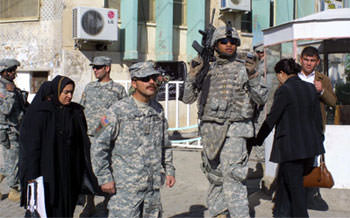
SULAYMANIYEH, KURDISH REGION, IRAQ — The mission was simple. The American military trainers were to accompany Kurdish Iraqi troops downtown to buy supplies. But the U.S. troops still had to wear full battle gear and travel in a three-humvee convoy.
Anywhere else in Iraq they would expect roadside bombs or deadly sniper fire. Here in the Kurdish region, they worry more about bumping into civilian cars on the narrow, traffic-clogged streets.
“You’re treated like a rock star” here in the Kurdish region, said Maj. Michael Perricane, a National Guard officer from Huntington Beach in Southern California. “You feel safe.”
The United States has 100 to 150 military trainers in this part of northern Iraq, according to Lt. Col. Dennis Chapman, who is in charge of evaluating the training. In an interview inside the U.S. base on the outskirts of Sulaymaniyeh, Chapman said the Kurds welcome the U.S. for freeing them from the tyranny of Saddam Hussein.
“There’s a profound reservoir of goodwill towards the U.S.,” said Chapman. “The Kurds have made the most of U.S. support.”
Chapman, Perricane and others are helping to transform the Kurdish political party militias, known as peshmurgas, into units of the Iraqi army. So far 3,000 peshmurgas from the Patriotic Union of Kurdistan (PUK) and the same number from the Kurdish Democratic Party (KDP) have gone through training to become regular Iraqi army.
But critics say the new Iraqi army units are more loyal to their party than to the Iraqi government. The U.S. is, they argue, helping professionalize party militias that are not likely to fight in other parts of Iraq and could end up at war with one another.
Asos Hardi, editor of the weekly newspaper Awene (The Mirror), said the U.S. faces the same problem in the Kurdish region as it does in other parts of Iraq. All the Iraqi army’s personnel “are loyal to their parties, their ethnic or religious group, more than the army,” he said.
In the late 1990s the PUK and KDP peshmurgas fought bloody battles for control of the Kurdish region. The militias now wear Iraqi army uniforms but would fight for their respective parties should such a conflict ever occur again, according to Hardi. “I can’t imagine the U.S. doesn’t understand this because they are dealing with the issue everyday.”
Lt. Col. Chapman emphatically denies such assertions. He concedes that “the whole Iraqi army is home-based. Every unit is recruited and operates mostly by region. But if an order comes down to go to Baghdad, they will go.”
Mustafa Qadir, deputy commander of the PUK peshmurgas, agreed. He said that once his units transform into the regular Iraqi army, he can no longer give them orders.
“They are free to be in the party or not,” he said. “It’s their choice.”
But, in practice, matters are far more complicated. For example, Qadir’s top aide, Sheik Hussein, is also a captain in the newly transformed Iraqi army. He said he commands some 200 men. “All of my men are PUK,” he said proudly.
Political parties in the Kurdish region play a far more extensive economic and social role than parties in the U.S. A party recommendation is necessary to get scholarships for overseas study and access to advanced education. No one can get a government job in the Kurdish region without support from the PUK or KDP, according to Hardi. “Even school principals must be approved by the parties,” he said.
Every soldier has a friend or relative beholden to one of the parties. So it comes as no surprise that army units continue their party affiliation, Hardi said. In addition, the peshmurgas have over 50,000 men still under direct party control who have not joined the Iraqi army, according to Qadir.
Neither the party peshmurgas nor the Kurdish units of the regular army do much fighting outside their home turf.
Kurdish units have fought in other parts of Iraq, but that deployment proved very controversial because of resentment by Iraqi Arabs. Today, Kurdish officers serve in various parts of Iraq, but Kurdish units outside of the Kurdish region serve only as a Baghdad protection force for President Jalal Talibani, who is a Kurd, and in two cities with sizable Kurdish populations, Mosul and Kirkuk.
Kurdish military officers are pleased that their troops are not involved in heavy fighting while the Kurdish region remains peaceful. “Kurdistan is safe so the U.S. doesn’t need a large number of troops here,” said Qadir.
He and other Kurdish leaders hope the U.S. will establish permanent military bases here. Permanent U.S. bases could help an independent Kurdish nation in the future, Qadir said. “It will help protect democracy in Iraq and in Kurdistan.”
Your support matters…Independent journalism is under threat and overshadowed by heavily funded mainstream media.
You can help level the playing field. Become a member.
Your tax-deductible contribution keeps us digging beneath the headlines to give you thought-provoking, investigative reporting and analysis that unearths what's really happening- without compromise.
Give today to support our courageous, independent journalists.
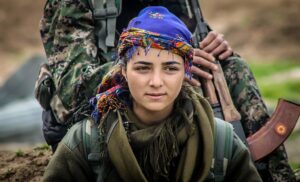
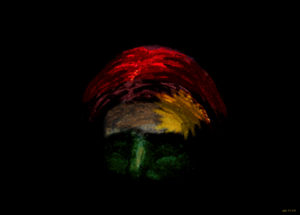
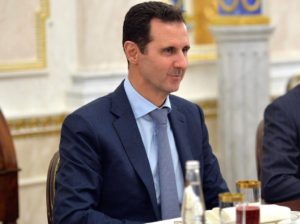
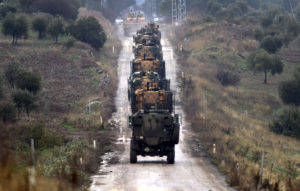

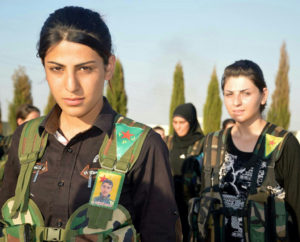
You need to be a supporter to comment.
There are currently no responses to this article.
Be the first to respond.